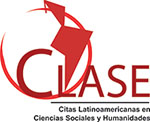Limitaciones del desarrollo turístico sostenible: caso de dos ecolodges en la Amazonía ecuatoriana
DOI:
https://doi.org/10.23857/dc.v4i3%20Especial.596Palabras clave:
Ecoturismo, desarrollo sostenible, biodiversidad, ecolodge, amazonÃa.Resumen
El ecoturismo tiene una perspectiva interesante en el marco de la industria del turismo, que considera el bienestar de la población local del lugar de destino, que garantiza una experiencia nueva a los turistas y contribuye a mantener un medio ambiente perdurable. Abordar el turismo en términos de sostenibilidad nos permite orientarnos hacia la protección y la perennidad de los recursos medioambientales. Por lo tanto, para garantizar el desarrollo de un sitio o de un destino es importante constituir una gestión a favor de la conservación, donde se involucre la participación de los diferentes actores. Sin embargo, el turismo sostenible también puede tener limitaciones tales como la oferta de biodiversidad y la implicación de la comunidad. Es por esto que la elaboración de esta investigación se realizó en el ómbito de los desafíos y límites del desarrollo sostenible en la Amazonía ecuatoriana.
Citas
Bansal, S., & Kumar, J. (2011). Ecotourism for Community Development: A Stakeholder's Perspective in Great Himalayan National Park. International Journal of Social Ecology and Sustainable Development, 31-40.
Camus, S., Hikkerova, L., Sahut, J.M. (2010). Tourisme durable: une approche systí©mique. Management & Avenir, N.34, abril 2010, p. 253-269.
Ceballos-Lascurain, H. (1987). The future of ecotourism. Mexico Journal, 13-14.
Donohoe, H. M., & Needham, R. D. (2006). Ecotourism: The evolving contemporary definition. Journal of Ecotourism, 192-210.
Dumoulin, D., Velut, S. (2010). Évaluer les modalití©s í©mergentes d'un tourisme durable en Amí©rique latine. Tourisme durable dans les Suds?. Editorial P.I.E.-Peter Lang S.a, Paris, pp. 223-238.
Fennell, D. (2001). A content analysis of ecotourism definitions. Current Issues in Tourism, (2001b) . Current Issues in.
Hellal, M., Jarraya, M. (2012). Les perspectives du dí©veloppement touristique durable dans un territoire insulaire vulne_rable: le cas des i_les de Kerkennah. Mondes en de_veloppement, n°157, p. 111-118.
Hí©ritier, S. (2007). Les parcs nationaux entre conservation durable et dí©veloppement local. Gí©ocarrefour, N. 4, mayo 2010, p. 71-75.
Hetzer, W. (1965). Environment, Tourism and Culture. Washington D.C.: Island Press.
Kim Lian Chan, J. and Baum, T. (2007). Motivation Factors of Ecotourists in Ecolodge Accommodation: The Push and Pull Factors. Asia Pacific Journal of Tourism Research, 12(4), pp.349-364.
Mehta, B., Baez, A., & O'Loughlin, P. (2002). International ecolodge guidelines. North Bennington, VT: The International Ecotourism Society.
Organización mundial del turismo (2016). Panorama OMT del turismo internacional. OMT. Madrid
Seguin, G., Rouzet, E., (2010). Marketing du tourisme durable. Editorial Dunod. Paris
TIES. (2015). The International Ecotourism Society. Retrieved Abril 18, 2017, from http://www.ecotourism.org/what-is-ecotourism
Toselli, C. (2015). Turismo, planificación estratí©gica y desarrollo local, Revista Turydes: Turismo y Desarrollo, n. 18 (junio 2015). En línea: http://www.eumed.net/rev/turydes/18/desarrollo-local.html
Ziffer, K. A. (1989 ). Ecotourism: The uneasy alliance. Washington D.C: Conservation.
Descargas
Publicado
Cómo citar
Número
Sección
Licencia
Authors retain copyright and guarantee the Journal the right to be the first publication of the work. These are covered by a Creative Commons (CC BY-NC-ND 4.0) license that allows others to share the work with an acknowledgment of the work authorship and the initial publication in this journal.







